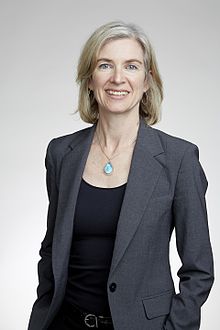User:Mdesire01/sandbox
Jennifer Doudna | |
|---|---|
 Jennifer Doudna at the Royal Society admissions day in London in 2016 | |
| Born | Jennifer Anne Doudna February 19, 1964 |
| Nationality | United States |
| Alma mater |
|
| Known for | |
| Spouse | Jamie Cate |
| Awards | |
| Scientific career | |
| Fields | Biochemistry |
| Institutions | University of California, Berkeley Yale University |
| Thesis | Towards the design of an RNA replicase (1989) |
| Doctoral advisor | Jack Szostak |
| Other academic advisors | Thomas Cech |
| Website | |
Jennifer Doudna is an American biochemist who teaches chemistry, biochemistry, and molecular biology at the University of California, Berkley. (“People.” Doudna Lab, doudnalab.org/people/.) She obtained her Bachelors in Biochemistry from Pomona College, Ph.D. in Biological Chemistry and Molecular Pharmacology from Harvard Medical School, and Postdoctorate in Biomedical Science from the University of Colorado Boulder. She wrote her thesis on the engineering a self-replicating catalytic RNA. Ms. Doudna's interest in RNA and its possible application has led to, major advances in the field of science.
In 2012, Doudna and her colleagues developed genome modification system named CRISPR. CRISPR stands for Clustered Regularly Interspaced Short Palindromic Repeats. “ CRISPR-Cas9 was adapted from a naturally occurring genome editing system in bacteria. The bacteria capture snippets of DNA from invading viruses and use them to create DNA segments known as CRISPR arrays. The CRISPR arrays allow the bacteria to "remember" the viruses (or closely related ones). If the viruses attack again, the bacteria produce RNA segments from the CRISPR arrays to target the viruses' DNA. The bacteria then use Cas9 or a similar enzyme to cut the DNA apart, which disables the virus.” (https://ghr.nlm.nih.gov/primer/genomicresearch/genomeediting)
Doudna furthered the application of CRISPR by creating a simpler system that can be programmed to target specific stretches of the genetic code and to edit DNA at precise locations. Because of all the work, she contributed to science, the possibilities for the future are endless. CRISPR has used in ways that will change life as we know it. Because of her work, Doudna has become a major influence in the science field.
Despite the advances made because of CRISPR technology, there is still a chance that people will abuse its power. Because of this, Doudna has made it her goal to ensure that this does not happen.
- ^ https://en.wikipedia.org/wiki/Jennifer_Doudna
- ^ "Alan T. Waterman Award Recipients, 1976 – present". National Science Foundation. Retrieved October 31, 2017.
- ^ "Emmanuelle Charpentier receives Jacob Heskel Gabbay Award". Umeå University. Retrieved October 31, 2017.
- ^ "Laureates: Jennifer A. Doudna". breakthroughprize.org. Retrieved October 31, 2017.
- ^ "Laureates of the Japan Prize: Jennifer A. Doudna, Ph.D." The Japan Prize Foundation. Retrieved November 1, 2017.
- ^ Doudna, Jennifer (2015). "Genome-editing revolution: My whirlwind year with CRISPR". Nature. 528 (7583): 469–71. Bibcode:2015Natur.528..469D. doi:10.1038/528469a. PMID 26701037.
